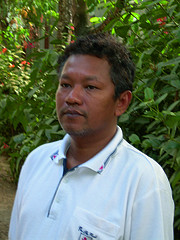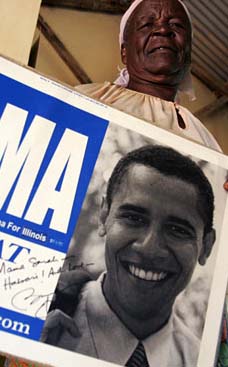
"We know that things are getting worse in Burma. In the past year, the number of political prisoners has doubled. If the regime cannot find the person they are hunting, they take a hostage instead: a father, a mother, a husband, a wife. My experience in prison is still a reality for thousands of people in Burma. Until the regime frees all of the political prisoners, there will be no democracy and no peace. But history tells us that these brutal regimes do not last, and Burma is no different. Twenty years ago, there were no organizations like mine. Today, there are dozens of groups fighting the regime. It takes constant pressure. But I know that with your support, changing Burma is not Mission Impossible. My friends and my country will be free." Journalist George Packer served as a Peace Corps Volunteer in Togo.
George Packer writes: Bo Kyi
Bo Kyi
Last February, in Mae Sot, Thailand, a transit point on the border with Burma, I met a Burmese man named Bo Kyi. He had smoker’s breath and bad teeth from chain-smoking cheroots, and he spoke passable English. His flat gaze gave very little away. Bo Kyi had been a political prisoner in Burma for many years. After his release, he had fled the country. In Mae Sot, he founded an organization called Assistance Association for Political Prisoners in Burma. His outfit occupied a small house on an obscure sidestreet—even in Thailand, dissidents aren’t safe from the reach of Burmese intelligence. In the front yard a wall was covered with black-and-white photographs—they looked like mug shots—of political prisoners in Burma, along with their length of sentence. Some of them had dates of death.
Bo Kyi was the sort of ordinary-looking man you meet in places like the on Thai-Burmese border. In a group of twenty you wouldn’t pick him out as the hero. Last Thursday, I ran into him again, at the Natural History Museum, in New York, where Human Rights Watch was holding its annual dinner. It was one of those slightly embarrassing occasions where the well-to-do, entirely safe and secure guests dress up and drink and make small talk before sitting down to pay their respects to people living in very different circumstances.
Bo Kyi was one of Human Rights Watch’s two honorees (the other was a journalist from Uzbekistan named Umida Niazova). I am reprinting his remarks, because they moved me, and because they help explain what motivates people like him:
I accept this award tonight on behalf of all my brothers and sisters standing tall in the horrific prisons of Burma.
I was arrested as I was eating with my family. I was handcuffed, hooded, and taken away in a car. I was ordered to lie down so that no one could see me.
When I removed my hood I saw I was in a tiny cell. During interrogation, they did not provide food and water. When I looked on the wall, I saw blood splatters from the prisoners who came before me. People had carved their names on the wall. Some of those names were the names of my friends.
I asked myself, “Where are they now?” Are they in prison? Are they being tortured? Are they dead?
I began to grow worry and realized that my torture had already started: denial of food and water, blindfolding and solitary confinement. I was locked up for 9 days and then transfer to prison.
In prison, I faced starvation. I slept on a thin mat on a concrete floor. We did not receive medical treatment. The prison was filthy and sanitation was very poor.
As a result of my treatment and many beatings, I began to suffer from hypertension, heart disease, and back pain which I still have.
The next time I was arrested, I spent more than 3 years in solitary confinement.
I was not allowed to read or write or study anything. It was intellectual killing. But when the guards were far away, I could hear the other prisoners. I used the time to learn English from them.
Finally, I was released. Soon after, I fled my country. I decided then to speak for my colleagues who still remain in prison.
That is what my organization—the Assistance Association for Political Prisoners in Burma—does with Human Rights Watch.
We have a way to communicate with the prisoners and get their stories out. I cannot tell you how we do this. I do not want the Burmese regime to find out. But I can tell you that these stories fill the pages of our reports and those of Human Rights Watch.
The media use these stories. So do political leaders around the world. Over time, the stories of these prisoners generate pressure on the international community to take a stand.
We know that things are getting worse in Burma. In the past year, the number of political prisoners has doubled. If the regime cannot find the person they are hunting, they take a hostage instead: a father, a mother, a husband, a wife.
My experience in prison is still a reality for thousands of people in Burma.
Until the regime frees all of the political prisoners, there will be no democracy and no peace.
But history tells us that these brutal regimes do not last, and Burma is no different.
Twenty years ago, there were no organizations like mine. Today, there are dozens of groups fighting the regime. It takes constant pressure. But I know that with your support, changing Burma is not Mission Impossible. My friends and my country will be free.













